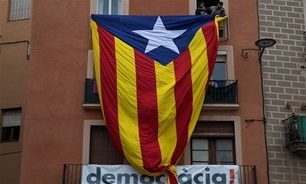Catalan Separatists Transferred to Madrid as Key Trial Nears
 There is no date set yet for the first hearing, but Judge Manuel Marchena ordered the separatists to be moved closer to the Supreme Court in Madrid by Saturday, AP reported.
There is no date set yet for the first hearing, but Judge Manuel Marchena ordered the separatists to be moved closer to the Supreme Court in Madrid by Saturday, AP reported.
Twelve defendants — nine in preventive custody and three more who were released on bail — could be imprisoned for decades if they end up convicted of rebellion, the gravest of the charges. They could also be fined if they were to be found guilty of misusing public funds. Defense lawyers say they should be acquitted.
The "trial of the century," as it's been labeled by domestic media, has taken on a high political significance. Separatists in the northeastern region have made clear that they will use the proceedings to prove that they are being tried for their ideas, and in particular for advancing a secessionist agenda.
The proceedings will be public and televised.
In addition to prosecutors and state attorneys, a far-right party that has recently emerged in Spanish politics sits on the prosecution bench. Vox wants to use the trial to showcase its hard-line stance against nationalism and its defense of Spanish unity ahead of European and local elections in May next year.
The charges emerge from the dramatic autumn of 2017 that brought the deepest political crisis in decades to Spain and its prosperous northeastern region, when separatists pushed ahead with a banned independence referendum on Oct. 1 and a violent police crackdown attempted to stop it.
Separatist Catalan lawmakers took their self-declared victory and made a unilateral independence declaration 26 days later.
Several more politicians, police officers and elected officials will also be tried in lower courts for their roles in the secession attempt.
The Catalan leader at the time, Carles Puigdemont, is campaigning for Catalonia's independence from Belgium, where he has avoided extradition to Spain.
Amog those who remained behind and were put in custody are his former no. 2, ex Catalan Vice President Oriol Junqueras, activist-turned-politician Jordi Sanchez and the former speaker of Catalonia's regional parliament, Carme Forcadell.
Supporters gathered early on Friday at the gates of three different prisons in Catalonia, where convoys of the regional police emerged ferrying the nine defendants — seven men and two women.
Some activists tried to block the vehicles by throwing themselves on the road, but were quickly removed by police, television footage showed.
The nine defendants were grouped at Brians 2, a penitentiary some 40 kilometers (24 miles) west of Barcelona, where Spain's Civil Guard took over and escorted them in a motorcade heading to two prisons in Madrid.
Prison authorities under Spain's Interior Ministry said that other details of the operation were being withheld for security reasons.
Message end/
